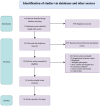Exercise intervention on the brain structure and function of patients with mild cognitive impairment: systematic review based on magnetic resonance imaging studies
- PMID: 39691788
- PMCID: PMC11650209
- DOI: 10.3389/fpsyt.2024.1464159
Exercise intervention on the brain structure and function of patients with mild cognitive impairment: systematic review based on magnetic resonance imaging studies
Abstract
Objective: This systematic review evaluates the impact of exercise intervention in MCI patients and discusses the potential neural mechanisms.
Methods: A systematic search and screening of relevant literature was conducted in English and Chinese databases. Based on predefined keywords and criteria, 24 articles were assessed and analyzed.
Results: Structurally, a significant increase was observed in the hippocampal and gray matter volumes of MCI patients following exercise intervention, with a trend of improvement in cortical thickness and white matter integrity. Functionally, after the exercise intervention, there were significant changes in the local spontaneous brain activity levels, cerebral blood flow, and functional connectivity during rest and memory encoding and retrieval tasks in MCI patients.
Conclusion: Exercise may contribute to delaying neurodegenerative changes in brain structure and function in patients with MCI. However, the underlying neural mechanisms require further research.
Systematic review registration: https://www.crd.york.ac.uk/PROSPERO/, identifier CRD42023482419.
Keywords: alzheimer’s disease; exercise intervention; magnetic resonance imaging; mild cognitive impairment; systematic review.
Copyright © 2024 Xu, Yu, Li and Wang.
Conflict of interest statement
The authors declare that the research was conducted in the absence of any commercial or financial relationships that could be construed as a potential conflict of interest.
Figures
References
Publication types
LinkOut - more resources
Full Text Sources


